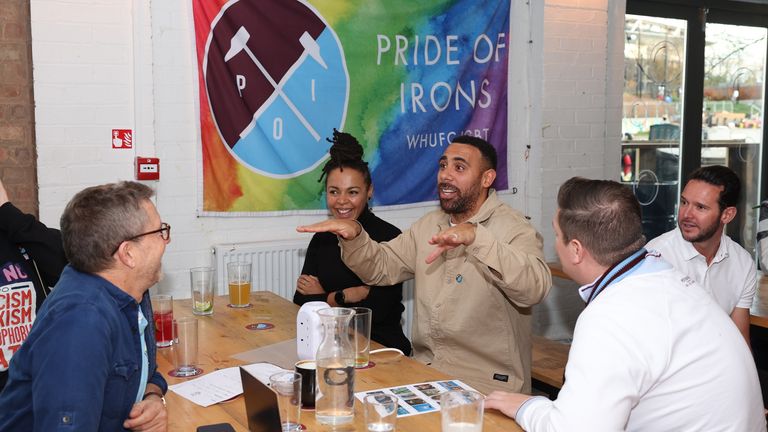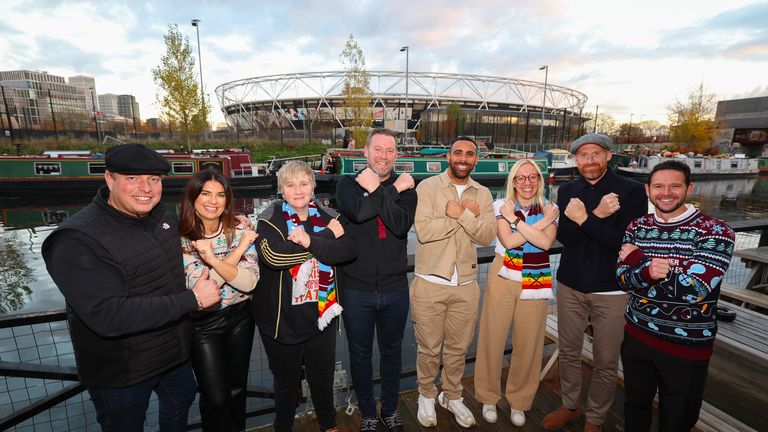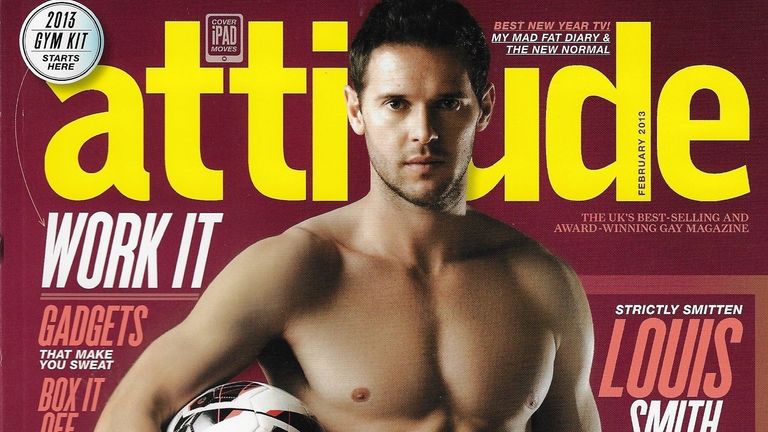Rainbow Laces: West Ham’s LGBTQ+ fan group praises club after ‘Pride Bar’ launch event | Football News
The growth of fan groups for LGBTQ+ people and allies in British football has been a remarkable development over the last decade.
Gay Gooners at Arsenal were the first, officially founded back in 2013, and were followed soon after by Proud Canaries (Norwich), Canal Street Blues (Manchester City) and Proud Lilywhites (Tottenham).
There are currently thought to be around 50 such groups that are active, raising awareness of diversity and creating opportunities for LGBTQ+ supporters to feel more welcome and safe when attending games, whilst also building community.
Pride of Irons began as a social media account that was started up by former chair Jim Dolan in the wake of a homophobic incident he experienced at West Ham’s old Upton Park home.
The group, for Hammers fans who are lesbian, gay, bi and trans, and for their friends and family, was officially launched with the Premier League club’s backing eight years ago and now has over 500 members.
To mark the close partnership between the club and the group, and to celebrate the 10-year anniversary of the Rainbow Laces campaign, a pop-up ‘Hammers Pride Bar’ will be in place at the Two More Years space in Hackney Wick near the London Stadium from Saturday for six days.
A special opening party this week brought together Pride of Irons and West Ham personnel, including former captain and first-team coach Kevin Nolan and club ambassadors Anton Ferdinand, James Collins and Matt Jarvis, who are also ex-players.
All fans will be welcome at the ‘Pride Bar’ from Saturday, December 2, spanning West Ham’s designated Rainbow Laces home game against Crystal Palace on Sunday – live on Sky Sports from 1pm (kick-off 2pm) – and the away fixture at Tottenham the following Thursday.
Pride of Irons co-chair Jo Bailey and secretary Lorna Severn were both in attendance at the ‘Pride Bar’ launch, and paid tribute to the way in which the Hammers have supported the group over the years.
From promotion and amplification, through to participation in Pride in London and similar events, and involving the group in its wider work on equality, diversity and inclusion, the close connection has set a benchmark for how professional clubs can successfully engage with this demographic of the fanbase.
The type of discriminatory incident that led to the creation of Pride of Irons is thankfully rare these days, but Bailey says there are still occasions when anti-LGBTQ+ abuse or behaviour occurs at the London Stadium.
“Knowing that the club is inclusive, and does embrace diversity, you know you’ve got the back-up and that you do feel safe, no matter where you’re sitting,” she told Sky Sports.
“If you want to report it, you can report it, and if you want to call it out, you can call it out – but you know you’ll always have backing from the club. And when we first started, that never really felt the case.”
The reports of extensive homophobic abuse at the Nottingham Forest vs Brighton game last weekend have served as a reminder of the need for a targeted campaign that raises awareness of LGBTQ+ inclusion in the Premier League.
The incidents at the City Ground are currently the subject of a police investigation. In recent months, Wolves, Leeds and Luton have all received six-figure fines from the Football Association after some of their supporters were judged to have taken part in mass homophobic chanting during Premier League fixtures.
“It’s not as common as maybe some people think but obviously it does exist and it is heard,” said Severn.
“The good thing is that it’s being reported now so there is more discussion around it and there’s the fact that it’s not tolerated.
“At our games, we now have the unity and the backing of Pride of Irons and therefore West Ham so you feel safer and more inclined to call it out. But it is still something we’re fighting to put a stop to.”
The creation of Pride of Irons was in large part due to the lack of visibility of LGBTQ+ people in men’s football. Dolan didn’t know if there was anyone else who would have felt similarly unwelcome and unsafe by the homophobia he witnessed, until he set up the social account and found other West Ham fans who are LGBTQ+ quickly gravitating to it.
Even now, with the group so well established, there are people at home and abroad discovering an accepting, friendly community that is there for them too.
“Every year, we get people who message us after these events saying ‘I didn’t know you existed and I’m so pleased’,” adds Severn.
“There are going to be fans and players that for various reasons can’t come out, and can’t be who they are.
“I just think what we can do and what we have done is give visibility to people who can’t be visible. We are giving them a voice and you can’t take away the importance of that.
“I’m so proud of West Ham for helping to champion us all the way for all these years.”
Jarvis was part of the Hammers first-team squad when the first Rainbow Laces campaign activation took place in English football in September 2013.
He had already established a reputation as a strong gay ally, having appeared shirtless on the front cover of Attitude magazine earlier that year – only the third pro footballer to do so after David Beckham and Freddie Ljungberg.
In a feature interview, he spoke about the need to tackle homophobia and change perceptions of the men’s game. At the time, surveys showed a quarter of fans thought football was an anti-gay sport.
Speaking to Sky Sports at the ‘Pride Bar’ launch, Jarvis – who hung up his boots two years ago – said the widespread interest and response to his magazine shoot at the time showed the need for progress.
“It was actually a lot bigger reaction than I thought but I’m really proud of it,” he reflected. “With the Rainbow Laces campaign coming along soon after, it was a massive starting point.
“I got a lot of letters from people about how much the interview impacted them which is exactly what the main part of it was all about.”
Over the years, various Premier League players have lent their voices in support of Rainbow Laces but many of the better-known allies – such as Hector Bellerin, Jordan Henderson and Conor Coady – are no longer plying their trade in the English top-flight.
Particularly in light of Henderson’s summer transfer to Saudi Arabia, there has been debate around what meaningful allyship looks like in the modern game. Teenage Blackpool striker Jake Daniels, who made history when he came out publicly via a Sky Sports interview last May, recently described Henderson’s switch to play in a country where same-sex relationships are criminalised as “a slap in the face”.
Meanwhile, as all 20 Premier League clubs activate Rainbow Laces at their home fixtures on the next two match rounds, Jarvis feels there is still “lots to do” in the English men’s game.
“I definitely think it’s moved on, and that’s in line with mental health, diversity and everything,” he added. “It’s just about keeping that message out there for everyone to truly understand what it means and to make sure that people get educated.
“In east London, it’s a huge part of the culture and that helps to make West Ham a family club and its supporters so passionate. That really helps the players on the pitch too.”
Sky Sports is a member of TeamPride which supports Stonewall’s Rainbow Laces campaign, currently receiving its annual activation from November 25 to December 10.
Your story of being LGBTQ+ or an ally could help to make sport everyone’s game – please contact us here to discuss further.




Pingback: 9 carat diamond price
Pingback: ทางเข้าpg
Pingback: Buy Body-Solid G9S Multi-Stack Weight Lifting Home Gym Complete Body Exercise